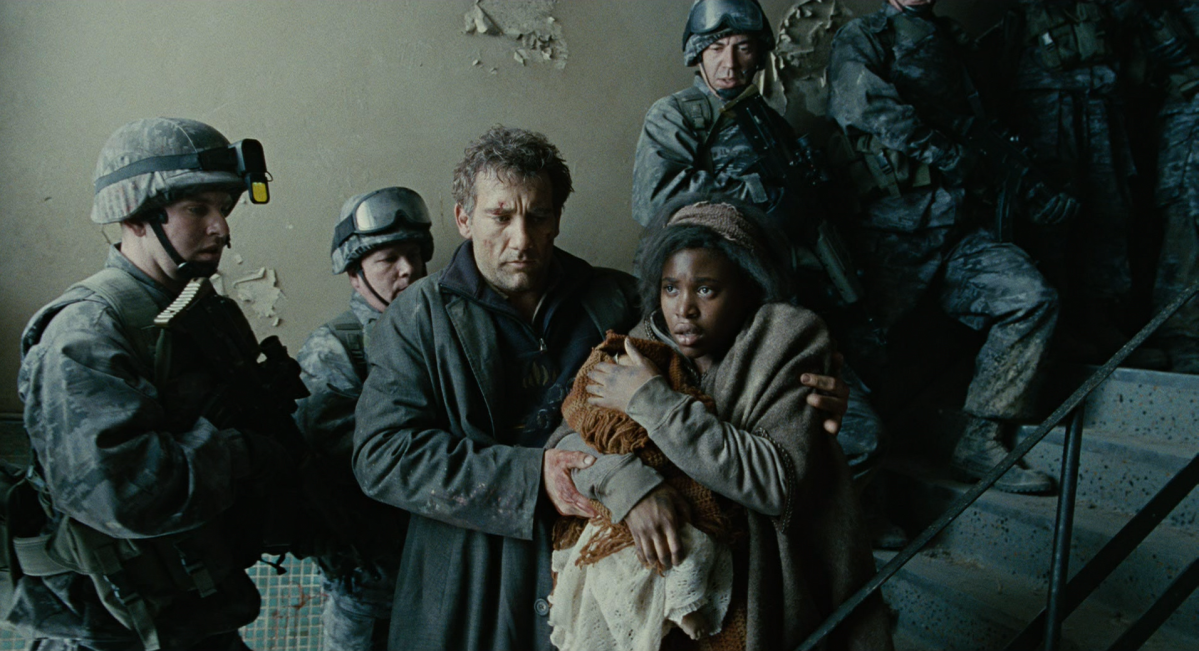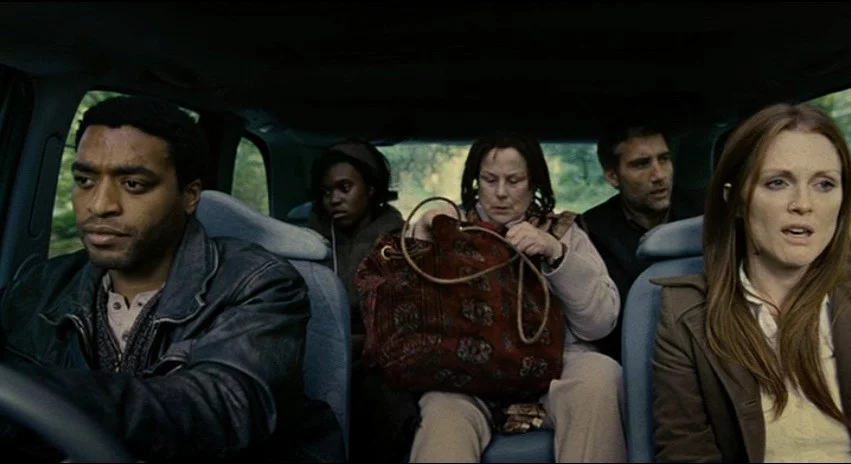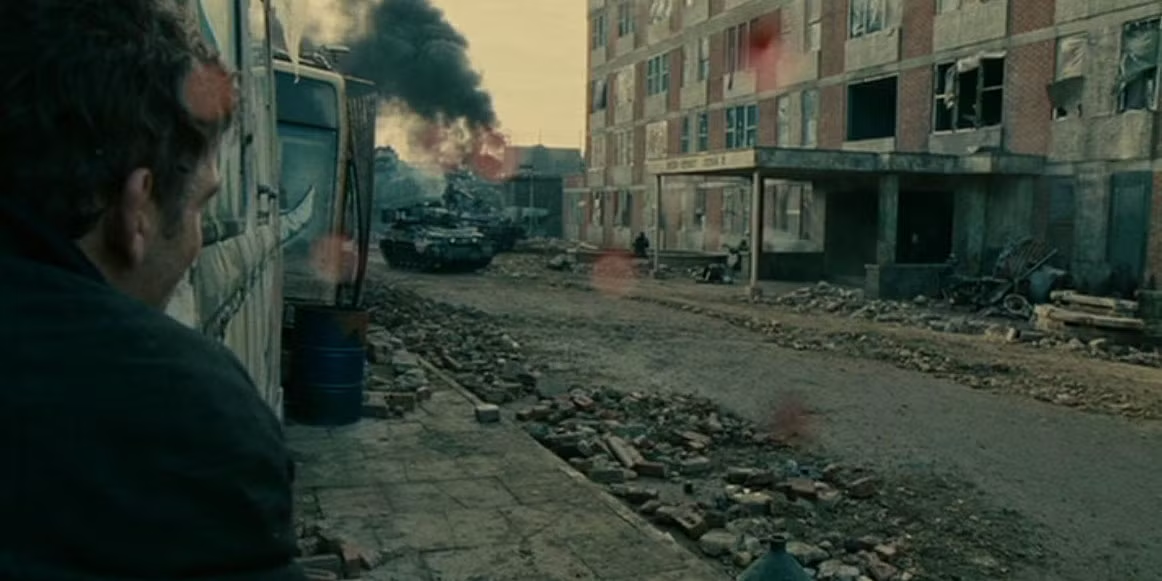Children of Men | Directed by Alfonso Cuarón // Starring Clive Owen, Julianne Moore, Clare-Hope Ashitey, Chiwetel Ejiofor, Michael Caine, and Pam Ferris
Set the mood with some music!
Summary (Spoiler-free): In a future where humanity has mysteriously lost the ability to reproduce, the world teeters on the edge of collapse. Children of Men follows Theo, a disillusioned former activist, who’s pulled into a mission to protect the first pregnant woman in nearly two decades. What unfolds is a tense, unrelenting journey through a society defined by fear, division, and despair — and a powerful story about hope, sacrifice, and the fight for something better.

There are great movies. There are important movies. And then there are movies like Children of Men — the kind that do both. Directed by Alfonso Cuarón and released in 2006, this film was ahead of its time in every conceivable way. Nearly two decades later, it feels even more relevant. Bleak but not hopeless, tragic but not manipulative, it’s a gut-punch of a movie that sticks with you long after the credits roll.
Set in a dystopian near-future where humanity has mysteriously lost the ability to reproduce, Children of Men follows Theo (Clive Owen), a disillusioned former activist who’s pulled into a mission to protect the first pregnant woman in nearly two decades. It’s a simple premise executed with haunting realism and an enormous amount of thematic weight.

This isn’t your typical “chosen one” story. There’s no prophecy, no clear heroes or villains, and no guarantee of anything working out. What makes the story hit so hard is how grounded it is. The government is oppressive. The resistance is fractured. Refugees are herded like cattle. There’s no moral clarity—just survival and compromise. And yet, buried beneath all that bleakness is something astonishing: a genuine, quiet hope. The belief that life can go on. That it should go on.
What’s even more shocking is how timely it all feels. Immigration crises. Government overreach. Climate anxiety. Propaganda as policy. Every frame of this film feels ripped from the headlines—even when the headlines came years after the movie came out.
Let’s get this out of the way: this is one of the best-directed films ever made. Period. Alfonso Cuarón doesn’t just tell a story — he builds a fully realized, terrifyingly plausible world and drops you into the middle of it with zero safety net. He may have gotten all the attention for Gravity years after this film, but this is his best work. There’s an urgency to how he moves the camera, how he stages scenes, how he places you right in the thick of chaos and never lets you look away. You don’t watch this movie. You live it.
And then there are the long takes — or the oners that Cuarón is famous for. These aren’t just showy technical feats. They serve the story. They make the tension feel unbroken, the danger immediate, and the characters’ desperation unshakably real. The infamous car ambush scene is a masterclass in blocking, timing, and emotional escalation. You’re trapped in that car with them, and it’s horrifying. Later, the battle scene through the refugee camp might be the most immersive war sequence ever filmed. The camera doesn’t cut away, and because of that, you don’t get to breathe.
Cuarón’s direction doesn’t call attention to itself, even when it absolutely deserves to. There’s no score telling you how to feel in these moments. There’s no flashy editing or heightened emotion. Just the raw, unfiltered reality of the world falling apart, seen through the eyes of people trying to hold on to their last shred of hope.
Clive Owen gives what might be the performance of his career. His portrayal of Theo is subdued, emotionally weathered, and deeply human. He’s not some reluctant action hero — he’s just a tired man trying to make it through another day in a world that’s completely lost its way. And that’s what makes him so compelling. You feel his exhaustion, his skepticism, and, gradually, the flicker of something like hope start to return. It's all played without melodrama or sentimentality. It’s subtle work, and it’s powerful.
The supporting cast is just as strong. Julianne Moore brings depth and warmth to a character with limited screen time. Chiwetel Ejiofor is magnetic and intense as a revolutionary with conflicted motives. Michael Caine is a scene-stealer in a role that could have easily veered into caricature, but he grounds it with real humanity and heartbreak. Clare-Hope Ashitey, as the pregnant woman at the heart of it all, carries so much of the film’s emotional weight, and she does it with a quiet strength that anchors the entire story. This isn’t a movie full of Oscar-bait monologues or big emotional breakdowns. It’s restrained, naturalistic, and all the more effective for it.
From a purely technical standpoint, Children of Men is a masterclass. Emmanuel Lubezki’s cinematography is practically mythic at this point, not just because of the long takes, but because of the way he captures a world on the brink. The camera moves like a human observer: sometimes steady, sometimes frantic, often hiding behind walls or ducking into corners. It’s immersive without being intrusive, always in service of the story’s emotional rhythm.
The editing by Alex Rodríguez and Alfonso Cuarón is precise and purposeful. It’s not about rapid-fire cuts or kinetic pacing. It’s about creating tension through space and silence. The fact that so many of the most harrowing moments play out in real time, without a single cut, speaks to the confidence in both the direction and the editing. They trust the audience to sit with discomfort. And it works.
The production design is flawless in its realism. The world of Children of Men doesn’t look dystopian in the futuristic, sci-fi sense — it looks like tomorrow, just slightly more broken. Graffiti-stained walls, overcrowded refugee camps, surveillance drones — it’s all terrifying because it feels so familiar. Nothing is exaggerated, and that makes everything feel more urgent.

Children of Men is not a fun watch. It’s not comforting. It doesn’t offer easy answers or moral victories. But that’s what makes it unforgettable. This is storytelling at its most urgent — where the direction, the writing, the performances, and the ideas all work in total harmony to create something bigger than the sum of its parts.
It’s the kind of movie that rewards your full attention and punishes distraction. It demands that you sit with the discomfort, the tension, and the quiet moments of grace that sneak in when you least expect them. Cuarón crafted a film that’s more than a cautionary tale — it’s a mirror. And what it reflects is terrifying, beautiful, and very, very real.
Children of Men isn’t just one of the best films of the 2000s. It’s one of the most essential films ever made.